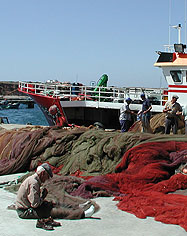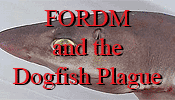|
|
"Some of the hottest journalistic action is still in following the money. But don't look to your local newspaper, newsmagazine or public radio station for enlightenment, because the money trails today often radiate from a handful of the nation's wealthiest "charitable" foundations, and end with those media outlets themselves." (Robert Fritchey - author of Wetland Riders) |
|
|
|
|
|
To be kept up-to-date on what's happening in or about the commercial fishing industry, to get notifications when new FishNet issues and Another Perspective columns are available, visit the Commercial Fishing - The Rest Of The Story blog by clicking here and subscribe via email or RSS feed. |
|
A directory of all past Another Perspective columns and the earliest editions of FishNet USA are available here. For information on who's getting what to control fishing in U.S. waters, visit the "Big Green Money Machine" website here. "One of the more clever things in this most recent bout of “market research” was the lumping of mining, drilling and fishing together. This seems to me to be tantamount to asking people how they feel about crimes committed by “murderers, rapists and shop lifters.” After the recent (and very possibly still ongoing) BP disaster in the Gulf of Mexico we all have a pretty accurate idea of what the potential downsides are to drilling in the oceans, and who hasn’t seen pictures of huge open pit mines (if you are one of the few who hasn’t, Google “open pit mine” and click on images)? Not in our ocean, huh? But in U.S.waters can anyone make a rational comparison of the potential impacts of mining, drilling and fishing?" Yet again the Pew Trusts, the Conservation Law Foundation and another handful of anti-fishing organizations are have embarked on a foundation-funded greenwashing campaign to close off even more of the the U.S. Exclusive Economic Zone to fishing. They're attempting it this time by trying to persuade President Obama to declare a huge and productive area off New England a National Marine Monument via presidential fiat. They are relying in large part on a poll by Edge Research a marketing research firm. Combining fishing with sea floor mining and drilling, they are basing much of their campaign on the fact that their poll revealed that the majority of the respondents would favor ocean protection. For the full FishNet piece go to https://www.Fishnet-USA.com/DejaVu.pdf. "For the past several years, fanned by what’s going on in modern Russia, there has been a lot of interest by the media in oligarchs and oligarchies. Defined as “a country, business, etc., that is controlled by a small group of people” (Merriam-Webster Online Dictionary), an oligarchy would seem to be the antithesis of government as Lincoln envisioned it. But along with the foregoing, follow some of the links below and then consider the influence Pew has in or over the domestic fisheries management system (and on fisheries management in other countries as well). And consider as well that thirteen people wield all that power. Of those thirteen people seven are in the founder’s family and at least twelve have significant ties to Sun Oil/Sunoco and/or the private bank that was formed to administer the trusts established with Sun Oil/Sunoco stock. You decide! To the extent that multi-billion dollar foundations such as Pew continue to have their way by mounting campaigns that any of the affected groups can’t afford to effectively counter, and by exerting influence in Washington that few in the private sector are capable of, the folks at the St. Augustine Lighthouse Museum who think the people can’t change government will be justified. And the rest of us, those of us who know that Lincoln had it right at Gettysburg, will be increasingly marginalized." For most of the past two decades the Pew Charitable Trusts have been playing an increasingly dominant role in how - and to what end - our fisheries are managed in the U.S. Exclusive Economic Zone (and in the fisheries of other nations as well). Backed by a multi-billion dollar endowment, the Trusts and their thirteen member Board have directly or indirectly (through many millions of dollars in grants to selected "fishermens" organizations, ENGOs, academic institutions, on their own and with "hired help") impacted fishery after fishery, and those impacts have largely been negative. In Who's really in charge of U.S. fisheries? at https://www.fishnet-usa.com/Of For By the People.pdf I examine the relationship between the Pew Trusts and fisheries and ocean governance. "It doesn’t matter that overfishing in U.S. waters is no longer a concern. It doesn’t matter that increasing ocean temperatures are affecting the “sustainability” of our fisheries to a much greater extent that overfishing ever has. It doesn’t matter that they are increasingly focused on what are nothing more than token fishing issues like saving deepwater corals, saving forage fish, completely eliminating bycatch or protecting huge areas of natural ocean through Marine Protected Areas (which are generally protected only from fishing). The sum total is fewer fish landed and at greater cost to the fishermen every year.... The bucks keep rolling in, the misinformation those bucks buy continues to influence the public and the non-coastal politicians, the lawsuits those bucks fund continue to put our fishermen out of business, the anti-fishing bureaucracies continue to grow and the anti-fishing salaries continue to increase." In Their careers and their futures depend on attacking fishermen and fishing. What more can we expect from them? I address the ever more trivial exercises that anti-fishing organizations and individuals are pursuing in order to keep their Blame it all on fishing band wagon rolling along and to keep their coffers overflowing. That's a natural condition for a successful bureaucracy to be in, because few of the people involved would be willing to call it a day while there was still money to be grubbed, regardless of how irrelevant their original mission has become. The full FishNet is at https://www.fishnet-usa.com/Living down to expectations.pdf "If the populations of most marine mammals and other highly efficient predators such as spiny dogfish have increased significantly over the past decade or three it’s obvious their predation, the largest part of natural mortality, inflicted on their prey species would have increased correspondingly. Yet is this factored into fisheries management programs? It appears not. It appears as if, as is apparently the case in New England, controlling fishing mortality is the only “effective” method (which really means “is the only easily available method”) by which managers assume that they can affect total mortality. Fisheries managers have to do something, because the whole fisheries management system is predicated on managing or on appearing to manage fisheries. So the natural mortality of a stock increases because of increasing predation and at this point, given research funding limits as well as limits on what we know about predation, the only way that the managers can compensate, which they are required to do by federal legislation and forced to do by a handful of mega-foundation funded ENGOs with huge bank accounts and droves of lawyers, is by reducing fishing mortality. What comes immediately to mind is a snake busily at work eating its own tail." In the FishNet Dogfish and seals and dolphin, oh my! I consider predation by several groups of voracious marine animals on our most valuable fisheries and the fact that neither our management system system nor federal laws allow it to be handled effectively, in fact making any claims that we are advancing towards true Ecosystem Based Management at best mistaken and at worst purposefully misleading. It's posted here in Adobe Acrobat format at https://www.fishnet-usa.com/Dogfish and seals and dolphin.pdf. |
|
Recent Editions |
Why we're here |
Current Edition |
(click logo for more information) |
|
Oceans are large, they are constantly changing, they are affected by all sorts of human activities and natural phenomena, and most of what goes on in them is hidden to us. Unless you're someone who makes a living dealing with the oceans at some level, your primary source of information vis a vis fishing, habitat degradation, etc. is the popular media. Unfortunately, today's journalists, producers and editors are poorly equipped, either via education, background or budget, to appreciate how complex ocean and fisheries issues actually are. Hence reporting on ocean issues - and the vast majority of the public's understanding of them - suffers greatly from today's soundbite culture. Poorly documented (or completely undocumented) press releases, supposed independent researchers bought and paid for by agenda-driven foundations, recreational fishing columnists who are little more than industry shills, short-sighted politicians whose interests extend no farther than keeping narrowly focused pressure groups happy, and competition among user groups are all conspiring to obscure what's really going on in the world's oceans today. Our goal is to present the "other side" of the picture, to do the research that isn't being done, and to - in the words of Watergate's Deep Throat - "follow the money." We need rational ocean policies, and we're never going to have them if our decision makers, and the public they are serving, don't fully appreciate what's going on. |
|
Earthjustice
just announced a lawsuit in which it is representing several small recreational
fishing groups, claiming that by the Council's declining to move ahead with
Amendment 15 to the Mackerel, Squid and Butterfish Fishery Management Plan,
NMFS is not providing adequate measures to "protect*" blueback
herring and alewife and American and Hickory shad." This is in spite of
the fact that both the Mid-Atlantic Fishery Management Council and NMFS fully
explained their reasons for proceeding as they have been and extending
assurances that the management provisions now in place would adequately protect
both river herring and shad (https://www.fishnet-usa.com/Flotsam
and jetsam_13.pdf)
|



